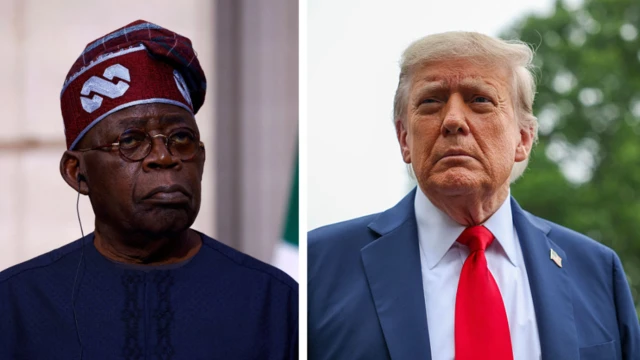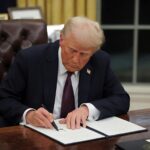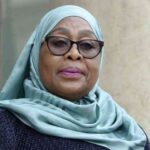The Nigerian government has rejected the United States President Donald Trump’s country of particular concern tag on the country.
The Nigerian government also rejected allegations of committing severe religious freedom violations.
In a statement issued on Saturday morning by the spokesperson for the Ministry of Foreign Affairs, Kimiebi Ebienfa, the government said Trump’s country of particular concern tag does not reflect the situation on the ground.
The statement reads in part: “The Federal Government of Nigeria notes the recent remarks by US President Donald Trump alleging large-scale killings of Christians in Nigeria and calling for the country’s designation as a ‘Country of Particular Concern.’
“These claims do not reflect the situation on the ground. Nigerians of all faiths have long lived, worked, and worshipped together peacefully.”
The government noted that while it “appreciates global concern for human rights and religious freedom,” the allegations were inaccurate.
Under the leadership of President Bola Tinubu, the statement continued, Nigeria “remains committed to fighting terrorism, strengthening interfaith harmony, and protecting the lives and rights of all its people.”
The ministry emphasised that Nigeria would “continue to engage constructively with the Government of the United States to deepen mutual understanding of regional dynamics and the country’s ongoing peace and security efforts.”
Pan-Atlantic Kompass had reported that on Friday, Trump, in a statement posted on his official Truth Social account announced that he had designated Nigeria as a “Country of Particular Concern,” citing what he described as an existential threat to Christianity in the country.
“Christianity is facing an existential threat in Nigeria. Thousands of Christians are being killed. Radical Islamists are responsible for this mass slaughter.
“I am hereby making Nigeria a ‘Country of particular concern’ — But that is the least of it,” Trump said.
Citing alarming figures, the US president added, “When Christians, or any such group, are slaughtered like is happening in Nigeria (3,100 versus 4,476 Worldwide), something must be done!”
What is the meaning of the Country of Particular Concern tag?
The U.S slams the country of particular concern tag on countries that show clear and consistent patterns of religious intolerance, discrimination, or persecution. It is a designation made by the U.S. Secretary of State with the president’s authority.
Countries are identified as CPCs based on what the U.S International Religious Freedom Act (IRFA) of 1998 establishes as “severe violations of religious freedom”.
The act lists the severe violations as:
• Torture or cruel, inhuman, or degrading treatment or punishment
• Prolonged detention without charges
• Causing the disappearance of persons by the abduction or clandestine detention of those persons
• Other flagrant denials of the right to life, liberty, or the security of persons
Following the designation, the U.S. government must select from a pre-defined list of actions, known as “Presidential Actions,” designed to address the religious freedom violations.
These actions can include:
• Imposing sanctions on the government officials responsible.
• Withdrawing, limiting, or suspending U.S. foreign or development assistance (excluding humanitarian aid).
• Withdrawing or suspending security assistance.
Global reactions
Trump’s Country of Particular Concern tag on Nigeria has drawn mixed reactions across political and religious circles, both in America and Nigeria.
A U.S Senator for North Carolina, Ted Budd has commended Trump for the decision.
The lammaker described Trump’s country of particular concern tag on Nigeria as “a necessary response to the brutal slaughtering of Christians and religious minorities.”
He wrote on X: “President Trump’s designation of Nigeria as a Country of Particular Concern is a necessary response to the brutal slaughtering of Christians and religious minorities. I am grateful to @POTUS and @SecRubio for their swift actions against terrorism and religious persecution.”
Also, Representative Marlin Stutzman commended Trump for the move, saying it was long overdue.
“Thank you @POTUS for labeling Nigeria as a COUNTRY OF PARTICULAR CONCERN! Christians are being relentlessly tortured and murdered, and this is a much-needed first step,” he posted.
Stutzman said he was working with lawmakers, including Senators Ted Cruz and Tom Cole, to “save lives in Nigeria.”
Also, a congressman from South Michigan, John James, thanked Trump for standing up for “persecuted Christians in Nigeria and around the world.”
“Last year, as Chairman of the House Foreign Affairs Africa Subcommittee, I demanded answers and actions from the Biden administration. While Biden chose silence and not to designate Nigeria as a Country of Particular Concern, President Trump did what Biden failed to do,” he added.
In Nigeria, a former Kaduna Central senator, Shehu Sani, has slammed Trump over the designation.
Sani stated: “Haiti is not a communist or terrorist country. It’s simply the poorest in the Western Hemisphere, next to the richest nation on earth. Where is the morality of your generosity and power when your friendly neighbour is poor, hungry, and wretched?”
Meanwhile, the International Secretary of the Ecumenical Synods of Bishops, Archbishops, Apostles, and Senior Clergy in London, Archbishop Osazee Williams, welcomed the designation but warned against framing it purely as a “Christian genocide.”
Williams said: “It is good that he declared Nigeria a country of particular concern, but branding it as Christian genocide brings a dangerous divide. During the Boko Haram crisis, Muslims were also victims. If Muslims were not killed, it would be easier to call it Christian persecution. There are systematic killings, yes, but every soul matters. The declaration should be about insecurity and loss of life generally, not just about religion.”





